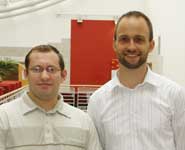The Morpho Challenge is an annual scientific contest held as part of the PASCAL Network of Excellence funded by the European Union. The objective is to design machine learning algorithms that discover the smallest meaningful syntactical units in words (called morphemes). These units, the ‘building bricks’ of word construction in natural languages, are used in many different areas of speech and language technology, including text-to-speech systems, automatic speech recognition, machine translation, and information retrieval.
The Bristol team, consisting of PhD students Sebastian Spiegler and Bruno Golenia and their advisor Professor Peter Flach, submitted several entries. One of these, developed by Sebastian Spiegler, won the competition in vowelized and non-vowelized Arabic and came third for Finnish. For German and Turkish the algorithms achieved top ranks.
‘This is not research aimed at inventing the next big thing on the web’, says Professor Peter Flach, ‘but we hope its results will be genuinely useful for people who do not speak one of the world's commercially interesting languages. Sebastian's success is very encouraging as it demonstrates the great potential of automated data analysis methods to help solve this very challenging problem.’
You can read more details on the news pages of the Department of Computer Science.
